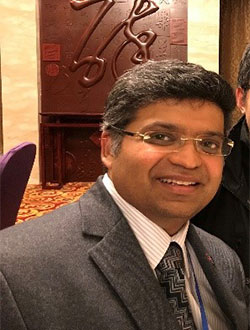
Prof. Prashant Valluri
Personal Chair in Fluid Dynamics and Head of Graduate School
Institute for Multiscale Thermofluids, School of Engineering,
The University of Edinburgh
Prashant.Valluri@ed.ac.uk
Professor Prashant Valluri received his PhD (2004) in Chemical Engineering from Imperial College London. His research focuses on tackling industrial multiphase flows with phase-change using bespoke numerical and theoretical techniques. These include stability analyses to understand interfacial instabilities, and DNS for combined heat-mass-momentum transport such as flows with phase change, and flows with mass-transfer and interfacial reactions. He is a Professor of Fluid Dynamics and the Chair of the UK-wide Multiphase Flows and Transport Phenomena Special Interest Group under the UK Fluids Network. As PI of ARCHER/HECToR eCSE 0804, e174 and e643 projects he led development of the ultra-fast high resolution TPLS 3.0 (Two-Phase Level-Set: https://sourceforge.net/projects/tpls/) and the GIS 1.0 (Gerris Immersed Solid Solver: https://github.com/eessmann/GISS) solvers. These solvers have been employed to gain understanding of fundamental phenomena during phase-change cooling of microelectronics. He is the Coordinator and the PI of the five-continent ThermaSMART project (funded by the European Commission) in which China is a major contributor with participation of Tianjin University of Commerce and Dalian Maritime University with 19 other major international participants
Title: Multiphase Flows Speak the Language of Instabilities
Abstract: Multiphase flows in industry exhibit myriad regimes driven by instabilities ranging across spatial and temporal scales. This is largely due to the complex interplay between momentum, heat and mass transfer occurring within these flows. Citing our recent work on evaporating droplets and interfacial flows, my talk will present a three-pronged approach of direct numerical simulations, experiments and stability analysis to reveal complexities in these multiphase and multicomponent flows. Understanding these complexities is critical towards designing engineering systems such as that of cooling of microelectronics or oil-gas pipelines.
.